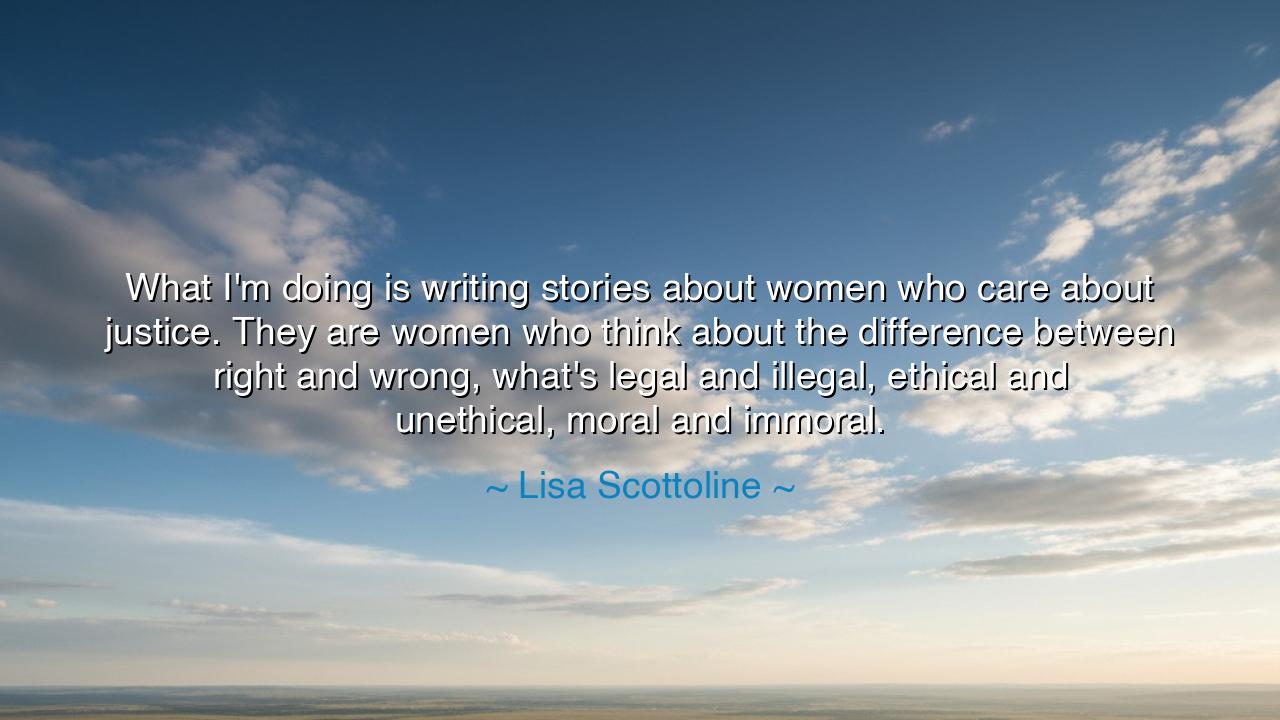
What I'm doing is writing stories about women who care about
What I'm doing is writing stories about women who care about justice. They are women who think about the difference between right and wrong, what's legal and illegal, ethical and unethical, moral and immoral.






Hear the words of Lisa Scottoline, spoken not as mere commentary on fiction, but as a declaration of a greater mission: “What I’m doing is writing stories about women who care about justice. They are women who think about the difference between right and wrong, what’s legal and illegal, ethical and unethical, moral and immoral.” These words are a torch passed down, affirming that storytelling is not idle entertainment but a vessel for truth, and that the lives of women, when told with honesty and courage, become mirrors in which society may see its conscience.
The meaning of this quote lies in the power of justice as lived through the eyes of women. In the halls of law and the courts of morality, women have long carried burdens that were invisible to those who wrote the codes of nations. Scottoline writes of women not only as seekers of fairness, but as thinkers who navigate the deep lines between law and conscience, who know that what is written as legal may still be cruel, and what is branded illegal may sometimes be righteous. Through her stories, she unveils the heroic truth: women stand as guardians of the moral compass, often in silence, yet with unyielding clarity.
The origin of these words comes from Scottoline’s own work as both lawyer and novelist. Having studied and practiced law, she knew firsthand the difference between the cold precision of statutes and the warmth—or absence—of human decency. Her fiction reflects this struggle, placing women at the center of moral battles where ethical choices must sometimes rise above legalistic frameworks. In a world where stories of male heroes long dominated, her voice lifted up heroines who embody justice not as abstraction, but as lived truth.
History provides living examples of the power Scottoline describes. Consider Rosa Parks, who sat upon a bus seat and defied the codes of segregation. By the measure of the law of her day, she was illegal. By the measure of eternal morality, she was profoundly just. Her act became a beacon that illuminated the difference between legal oppression and moral freedom. She, like the women of Scottoline’s stories, knew that true justice requires courage to walk between the lines drawn by men and the laws written in the heart.
The lesson is this: justice cannot be confined to statutes and regulations alone. It must be guided by what is ethical and moral, for there are times when the law itself may be bent by the will of the powerful. It is then that individuals—often the overlooked, the marginalized, the women of whom Scottoline writes—rise to speak truth to power, reminding nations that legality is not always righteousness. Laws may change with time, but justice demands constancy of heart.
What then must we do? We must honor those voices—especially the voices of women—who call us to examine not only what is legal, but what is right. Read their stories, listen to their lives, and let their struggles shape your own conscience. In daily life, choose not only by the rules of the land, but by the eternal principles of compassion, fairness, and dignity. When faced with choices, ask yourself not only, “Is this permitted?” but “Is this just?”
Thus, remember Lisa Scottoline’s words: “I write of women who care about justice, who discern between legal and illegal, moral and immoral.” Pass this wisdom to future generations—that heroes are not only those who wield power, but those who uphold truth when the world turns its face away. Teach that justice requires courage, and that the greatest strength lies not in physical might, but in the clarity to know right from wrong, and the courage to act upon it. For in such stories, humanity remembers who it is, and who it is called to be.






AAdministratorAdministrator
Welcome, honored guests. Please leave a comment, we will respond soon